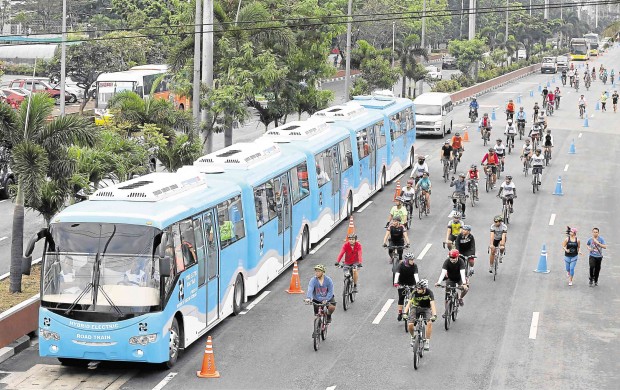
COEXISTENCE The hybrid road train developed by the DOST runs on its designated lane next to those allotted for bikers during Sunday’s road-sharing demonstration on Roxas Boulevard. MARIANNE BERMUDEZ
More than 3,000 cyclists, runners and environmental activists took over the southbound lane of Roxas Boulevard on Sunday morning to show that “road sharing” is no utopian dream but a doable scheme for commuters even in a mega-capital like Metro Manila.
Among them was engineer Ed Santos of the Department of Public Works and Highways-National Capital Region (DPWH-NCR), who biked all the way from Bulacan province with some of his friends.
For the 55-year-old Santos, who started biking when he was five, “it is about time we had a change of mindset and an advocacy for the environment.” He stressed the importance of having designated lanes for bikers and runners for their own safety.
Dubbed “KalyeShare” (an apparent play on the title of a popular TV comedy sketch), the activity sought to test the road-sharing principle being pushed by the Bayanihan sa Daan Movement since 2014.
As the group put it, the idea is to “reclaim the roads for the carless citizens” by allotting half of Metro Manila roads for nonmotorized transport—and alter the prevailing mind-set that roads are only for motorized vehicles.
Starting at 7 a.m., the 5.5-kilometer southbound stretch of Roxas Boulevard, from Edsa in Pasay City to Plaza Mexico in Intramuros, Manila, was divided into four lanes—one for persons with disabilities (PWD) and children, one lane for pedestrians, another for bikers, and last lane for three mass transports: the hybrid road train developed last year by the Department of Science and Technology (DOST), a double-decker bus and a PWD-friendly bus.
Blue and orange traffic cones served as lane separators.
Environmentalist and lawyer Antonio “Tony” Oposa, who pioneered the road sharing campaign in the country, said reducing the dependence on cars could accomplish two things at once: reduce traffic congestion and curb air pollution.
“We join hands in this historical event which we plan to continue in the future with your help,” Oposa said, addressing the various government agencies and private groups who showed up for the event, which kicked off near the SM Mall of Asia complex in Pasay.
He noted that the 5-km distance covered on Sunday will eventually be increased until a “road network” applying the principle is created in the metropolis.
Also in attendance were Metropolitan Manila Development Authority Chair Emerson Carlos and General Manager Cora Jimenez, Philippine Presidential Adviser for Environmental Protection and General Manager of the Laguna Lake Development Authority Nereus Acosta and Public Works Secretary Rogelio Singson.